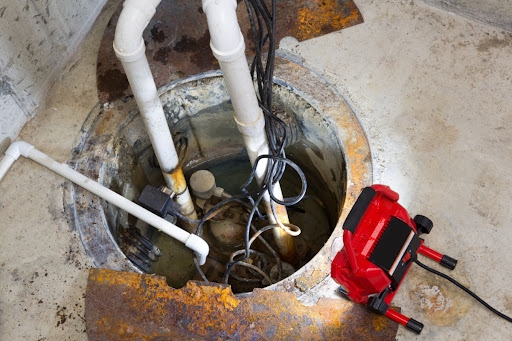Sump pumps can help homeowners avoid flooding. This is a big deal, as any kind of flooding can lead to serious water damage and costly repairs.
If you live in an area prone to heavy rains or flooding, you might wonder if you should consider installing a sump pump. However, before you make a decision, it can be helpful to know how sump pumps work and when they’re necessary.
So, how does a sump pump work? When should you consider installing one of these helpful devices? We’ll answer these questions and more below.
What Is a Sump Pump?
The objective of a sump pump is pretty straightforward. When water enters the lowest point in your home, the sump pump works by pumping it out of your home and discharging it outdoors.
So, how does a sump pump work in a more technical sense? As water enters the sump pit, it will continue to fill up the basin until it reaches a certain level. When the water reaches a designated level, this will trigger the float switch. As you can probably imagine, the float switch signals the sump pump to turn on.
Once the device has been switched on, it pumps the water out of your home via a discharge pipe. Fortunately, the discharge pipe also has a check valve that prevents the water from flowing back into the sump pit.
Types of Sump Pumps
There are two primary types of sump pumps to choose from. Submersible sump pumps are some of the most common, as they’re installed in the floor. As the name suggests, submersible pumps are “submerged” beneath the water.
On the other hand, you have pedestal pumps. These devices are installed above the floor and placed on a “pedestal.”
Along with a primary sump pump, you might also want to consider having a backup device installed. Backup sump pumps can come in handy if your primary pump breaks down or stops working when you need it most.
When Do You Need a Sump Pump?
Now that you know how sump pumps work, you’re probably wondering if you should consider a sump pump installation to prevent flooding. In most cases, having a pump installed is a good idea. This is especially true if you have a basement located close to the water table, as this can mean your basement is more prone to flooding.
Where Does the Water Come From in a Sump Pump?
Your sump pit will switch on whenever water enters your sump pit, whether that’s from rain or snowmelt. If you currently live in an area that’s prone to heavy rains or snow, you can see how installing a sump pump can be beneficial. When this water seeps into the ground around your home, it can easily find its way into the lowest point in your home.
How Often Should a Sump Pump Run?
Of course, knowing how sump pumps work can be incredibly helpful. However, you might still want to know how often they should run.
Generally speaking, your sump pump should only switch on when there’s water present. However, if your pump turns on when there isn’t water or it keeps running for seemingly long periods, the float switch could be stuck in the “on” position. In any case, you should call a professional plumber if the pump never shuts off, as this indicates something is wrong and needs fixing.
Now, you also might be wondering: how does a sump pump work when the power goes out? Unfortunately, these devices need electricity to operate. Fortunately, you can install a battery backup sump pump that doesn’t operate on electricity. Investing in a backup system can end up saving you money, as it can help prevent water damage during a serious flood.
Call Our Sump Pump Experts in Dallas, TX!
How does a sump pump work? As you can see, these helpful devices contain many moving parts that work in tandem to prevent flooding in your home.
Now that you understand how sump pumps work, turn to Pure Plumbing for an installation! We offer many services for sump pump systems, so whether you’re just starting with an installation or need a sump pump repair in Dallas, we can help.
Our plumbing experts are committed to providing you with top-notch services. Whether you need an emergency plumber in Dallas-Fort Worth, TX, or wish to schedule an appointment, we’re happy to accommodate your needs. Contact us today!


